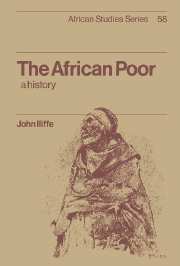Book contents
- Frontmatter
- Contents
- Preface
- 1 The comparative history of the poor
- 2 Christian Ethiopia
- 3 The Islamic tradition
- 4 Poverty and power
- 5 Poverty and pastoralism
- 6 Yoruba and Igbo
- 7 Early European initiatives
- 8 Poverty in South Africa, 1886–1948
- 9 Rural poverty in colonial Africa
- 10 Urban poverty in tropical Africa
- 11 The care of the poor in colonial Africa
- 12 Leprosy
- 13 The growth of poverty in independent Africa
- 14 The transformation of poverty in southern Africa
- Notes
- Bibliography
- Index
10 - Urban poverty in tropical Africa
Published online by Cambridge University Press: 31 October 2009
- Frontmatter
- Contents
- Preface
- 1 The comparative history of the poor
- 2 Christian Ethiopia
- 3 The Islamic tradition
- 4 Poverty and power
- 5 Poverty and pastoralism
- 6 Yoruba and Igbo
- 7 Early European initiatives
- 8 Poverty in South Africa, 1886–1948
- 9 Rural poverty in colonial Africa
- 10 Urban poverty in tropical Africa
- 11 The care of the poor in colonial Africa
- 12 Leprosy
- 13 The growth of poverty in independent Africa
- 14 The transformation of poverty in southern Africa
- Notes
- Bibliography
- Index
Summary
The poor of pre-colonial Africa were bred in the countryside but seen in the town. That is why they were so often overlooked: pre-colonial Africa had few towns. During the colonial period towns grew quickly. Observers, white or black, noticed more and more poor people and assumed that their numbers were increasing and that towns created them. Colonial Africa – in contrast to the Africa of the 1980s – regarded poverty as an urban problem. The children picking over Nairobi's dustbins or the destitutes sleeping in Kumasi's markets were seen as products of urban degeneration. In reality most were countrymen hoping to exploit urban opportunities.
Yet if towns rarely created poverty, they gave it new forms. The crowded squalor of a slum, exhausting and repugnant labour, hunger amidst plenty, a prostitute's life or a pauper's death, the humiliation of prolonged unemployment, the discovery that even kinsmen were not infinitely hospitable – all these were lessons for the urban poor to learn. As new forms of poverty – proletarianisation, unemployment, prostitution, delinquency – supplemented older forms of incapacitation, servitude, and hunger, so towns pioneered the transition in the nature of poverty which is a central subject of this book.
Late nineteenth-century Lagos provides a starting-point, for it is richly documented and was an indigenous town brought under British rule in 1861 at an early stage of colonialism. Most of its ordinarily poor people were long-established townsmen. Of 32,508 people enumerated in 1891, 12,040 were traders.
- Type
- Chapter
- Information
- The African PoorA History, pp. 164 - 192Publisher: Cambridge University PressPrint publication year: 1987

